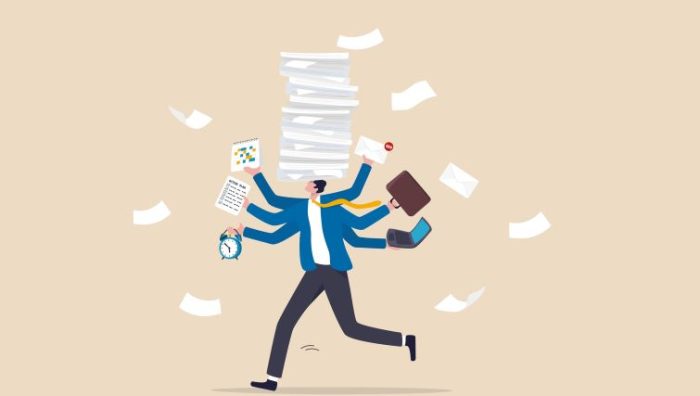8 Warning Signs of Workaholism: How to Identify it in High Achievers
 Publié le 17 December 2024
Publié le 17 December 2024
Make sure that your workforce remains happy and healthy on the job by knowing how to identify 8 warning signs of workaholism.
Have you ever found yourself unable to fully unwind after work, with that nagging feeling of unfinished tasks hovering in the back of your mind? Industriousness is a fantastic quality—until it goes too far. This state of constant duty is often a sign of workaholism. What is that, and how serious is that? This term was introduced in the 1970s by psychologist Wayne Oates, who first labeled it as a type of addiction.
Since then, the pressure in working spaces has only grown. More and more people are trying to achieve more at any cost. Workaholism has become more than an individual habit; it’s now a widespread issue that affects relationships and physical and mental health. In recent years, the situation has grown particularly alarming. With the increasing popularity of remote work, the line between work and private line has almost blurred. How dangerous is workaholism, and how to avoid it
The dangers of workaholism
Work addiction is often associated with success and productivity. However, the reality is entirely different. Workaholism does not seem to be a typical disease, but its consequences can be killing. Excessive work brings chronic stress, anxiety, and depression. It ruins physical health through insomnia, fatigue, and weakened immune systems. Additionally, this lifestyle can break relationships with family and friends and lead to social isolation and loneliness. Furthermore, it can stop career progression as burnout can reduce productivity and creativity.
These are not pure words. Studies show that working over 55 hours a week increases your risk of stroke by 33% and heart disease by 13%. It’s crucial for high achievers to recognize the signs of workaholism and prioritize their well-being.
How to identify workaholism in high achievers?
It is quite tricky to spot workaholism in high achievers. They often push themselves to excel and may hide their stress well. However, a few signs can alarm an unhealthy obsession with work.
Common signs
- Working overtime. High achievers often think they need to be ahead of others and stay at the office late or work on weekends.
- No personal life. Such people ignore social activities or family communication and dedicate all their time to work.
- Stress-driven habits. Increased caffeine consumption, heavy smoking or other stress-related habits are always red flags.
- The desire to be the first and the best. Workaholics are always ready to take on extra tasks, even when they are already overloaded.
Hidden signs
- Chronic physical states. These include regular headaches, fatigue, or digestive issues that don’t seem to improve over time.
- Sleep issues. Workaholics suffer from insomnia due to overthinking.
- Anxiety. They develop constant worries about job performance or the pressure to meet high expectations.
- Emotional exhaustion. Feelings of chronic stress can manifest in irritability and poor interactions with family or friends.
Strategies to combat workaholism
If you have noticed any of the above symptoms, it is time to act. Workaholism is not a verdict, and you can overcome it with some effort. Here are a few proven strategies that will help you.
Set strict rules
High achievers are usually disciplined. So they will be able to introduce clear boundaries. Instead of endless working hours, create dedicated time blocks for focused work. Aim to get the best out of your energy in those windows, then take real breaks.
- Try the 52/17 rule. Try a pattern where you work with full concentration for 52 minutes and then take a 17-minute break. It will allow you to stay focused without overloading your brain. This approach will help you maintain a steady level of productivity.
- Learn to say “no” and delegate tasks. You don’t have to do everything yourself. Delegate tasks where possible and say “no” to commitments that do not fit your schedule.
Learn to disconnect
Set specific times when you disconnect from work-related devices and notifications. During these breaks, you can take a walk, devote time to your hobby or simply let your eyes rest from the screen. Moreover, learn to forget about your work after working hours.
- Experiment with a digital detox ritual. Designate hours when you do not interact with any devices. During these “off” times, do not check emails or messages, forget about your burning ai-900 practice test and do not respond to incoming calls. Instead, focus on breath exercises or meditation. These pauses can make your day feel more balanced.
Redefine your success
Success does not mean climbing the career ladder only. Set markers that value your health, relationships, and passions. You’re more than your work, and acknowledging this helps with balance.
- Celebrate non-work wins. It can be a new skill, an evening with friends, or even a trip. These moments matter just as much as work milestones.
When to seek professional help
If you’re struggling with self-help strategies aren’t enough, do not hesitate to reach out for professional help. A therapist can provide guidance, tools, and support to develop healthier coping mechanisms.
Signs that may indicate the need for professional help include persistent feelings of anxiety, depression, or physical health problems that excessive work brings.
Online resources that help to overcome workaholism
There are many online tools that will help you in the fight against excessive work habits:
- Therapy platforms. BetterHelp and Talkspace services can connect you with therapists who can help you develop healthy work habits and get rid of stress.
- Time management tools. Apps like RescueTime will track your work patterns and encourage regular breaks to prevent burnout.
- Mindfulness apps. Try Headspace or Calm for guided meditations that promote relaxation and work-life balance.
- Support communities. Join forums such as r/Workaholics where people with similar problems communicate..
Wrapping up
If you are a high achiever, these ideas may seem difficult to implement at first glance. But remember, big changes need much patience. When you know the 8 warning signs of workaholism, you will be better able to identify concerning habits in yourself and colleagues. Each small step is your proven path to lasting habits. So, take breaks, set boundaries, and delegate tasks—soon you will notice your productivity grows as well as your personal life improves.







